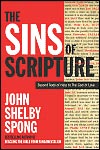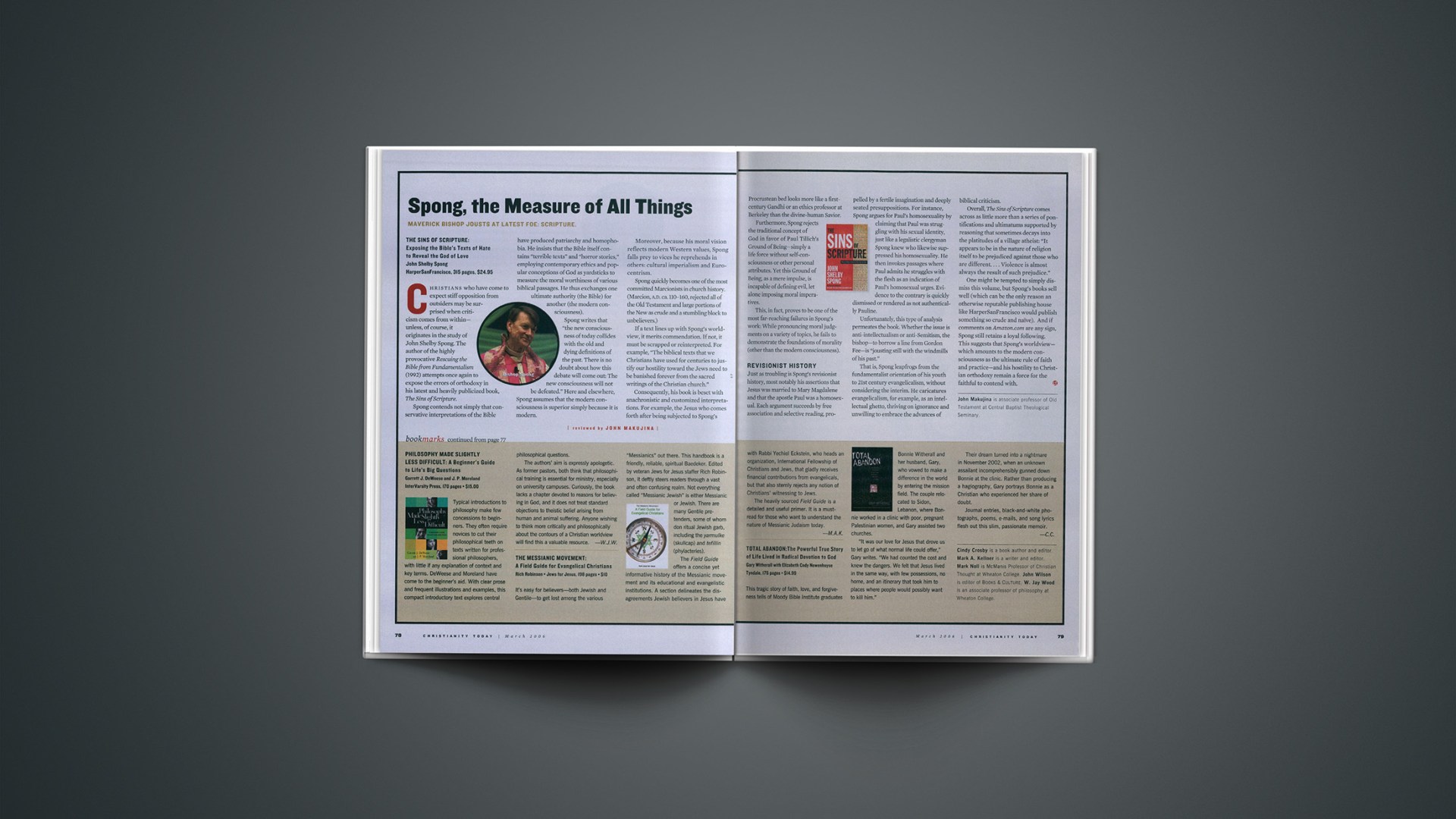Christians who have come to expect stiff opposition from outsiders may be surprised when criticism comes from within—unless, of course, it originates in the study of John Shelby Spong. The author of the highly provocative Rescuing the Bible from Fundamentalism (1992) attempts once again to expose the errors of orthodoxy in his latest and heavily publicized book, The Sins of Scripture.
 THE SINS OF SCRIPTURE: Exposing the Bible’sTexts of Hateto Reveal theGod of Love John Shelby Spong HarperSanFrancisco, 315 pp.; $24.95 |
Spong contends not simply that conservative interpretations of the Bible have produced patriarchy and homophobia. He insists that the Bible itself contains “terrible texts” and “horror stories,” employing contemporary ethics and popular conceptions of God as yardsticks to measure the moral worthiness of various biblical passages. He thus exchanges one ultimate authority (the Bible) for another (the modern consciousness).
Spong writes that “the new consciousness of today collides with the old and dying definitions of the past. There is no doubt about how this debate will come out: The new consciousness will not be defeated.” Here and elsewhere, Spong assumes that the modern consciousness is superior simply because it is modern.
Moreover, because his moral vision reflects modern Western values, Spong falls prey to vices he reprehends in others: cultural imperialism and Eurocentrism.
Spong quickly becomes one of the most committed Marcionists in church history. (Marcion, A.D. ca. 110-160, rejected all of the Old Testament and large portions of the New as crude and a stumbling block to unbelievers.)
If a text lines up with Spong’s worldview, it merits commendation. If not, it must be scrapped or reinterpreted. For example, “The biblical texts that we Christians have used for centuries to justify our hostility toward the Jews need to be banished forever from the sacred writings of the Christian church.”
Consequently, his book is beset with anachronistic and customized interpretations. For example, the Jesus who comes forth after being subjected to Spong’s Procrustean bed looks more like a first-century Gandhi or an ethics professor at Berkeley than the divine-human Savior.
Furthermore, Spong rejects the traditional concept of God in favor of Paul Tillich’s Ground of Being—simply a life force without self-consciousness or other personal attributes. Yet this Ground of Being, as a mere impulse, is incapable of defining evil, let alone imposing moral imperatives.
This, in fact, proves to be one of the most far-reaching failures in Spong’s work: While pronouncing moral judgments on a variety of topics, he fails to demonstrate the foundations of morality (other than the modern consciousness).
Revisionist history
Just as troubling is Spong’s revisionist history, most notably his assertions that Jesus was married to Mary Magdalene and that the apostle Paul was a homosexual. Each argument succeeds by free association and selective reading, propelled by a fertile imagination and deeply seated presuppositions. For instance, Spong argues for Paul’s homosexuality by claiming that Paul was struggling with his sexual identity, just like a legalistic clergyman Spong knew who likewise suppressed his homosexuality. He then invokes passages where Paul admits he struggles with the flesh as an indication of Paul’s homosexual urges. Evidence to the contrary is quickly dismissed or rendered as not authentically Pauline.
Unfortunately, this type of analysis permeates the book. Whether the issue is anti-intellectualism or anti-Semitism, the bishop—to borrow a line from Gordon Fee—is “jousting still with the windmills of his past.”
That is, Spong leapfrogs from the fundamentalist orientation of his youth to 21st century evangelicalism, without considering the interim. He caricatures evangelicalism, for example, as an intellectual ghetto, thriving on ignorance and unwilling to embrace the advances of biblical criticism.
Overall, The Sins of Scripture comes across as little more than a series of pontifications and ultimatums supported by reasoning that sometimes decays into the platitudes of a village atheist: “It appears to be in the nature of religion itself to be prejudiced against those who are different. … Violence is almost always the result of such prejudice.”
One might be tempted to simply dismiss this volume, but Spong’s books sell well (which can be the only reason an otherwise reputable publishing house like HarperSanFrancisco would publish something so crude and naïve). And if comments on Amazon.com are any sign, Spong still retains a loyal following. This suggests that Spong’s worldview—which amounts to the modern consciousness as the ultimate rule of faith and practice—and his hostility to Christian orthodoxy remain a force for the faithful to contend with.
John Makujina is associate professor of Old Testament at Central Baptist Theological Seminary.
Copyright © 2006 Christianity Today. Click for reprint information.
Related Elsewhere:
The Sins of Scripture is available from Amazon.com and other book retailers.
re:generation quarterly reviewed Spong’s autobiography, Here I Stand.
More about Spong is available from his website, and his Beliefnet commentaries, including an excerpt on the Apostle Paul’s homosexuality, are also online.
For book lovers, our 2005 CT book awards are available online, along with our book awards for 2004, 2003, 2002, 2001, 2000, 1999, 1998, and 1997, as well as our Books of the Twentieth Century. For other coverage or reviews, see our Books archive and the weekly Books & Culture Corner .










